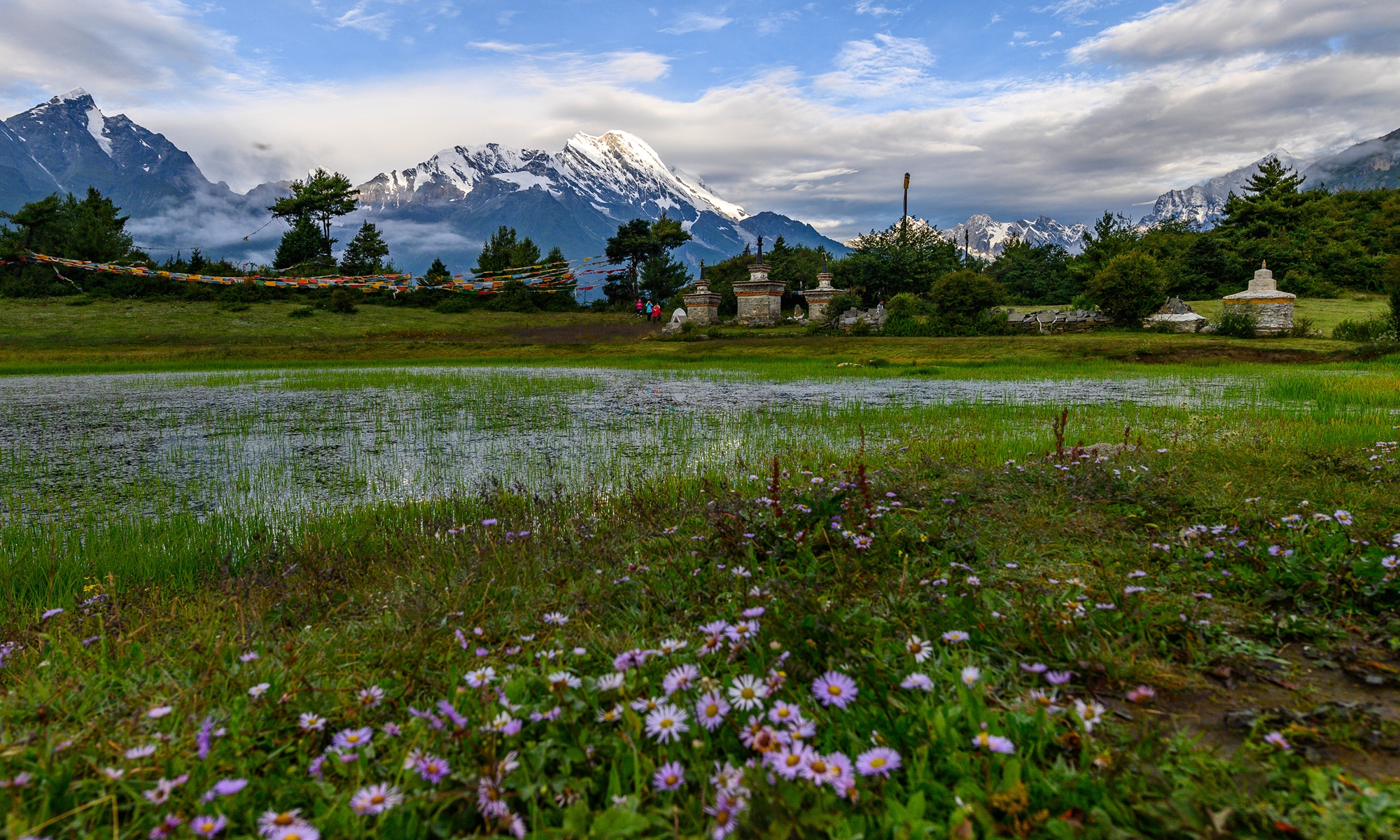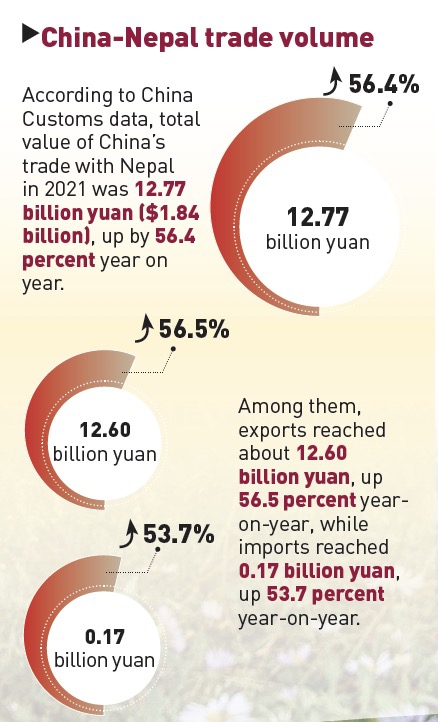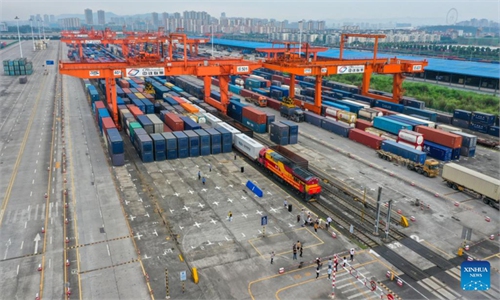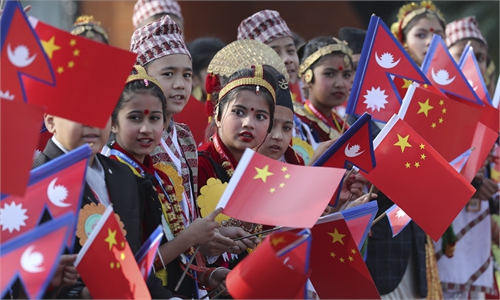IN-DEPTH / DIPLOMATIC CHANNEL
Close friendship with China is Nepal’s choice; China’s second centennial goal ‘definitely’ to be achieved: Nepali envoy
Mutual benefit

Nepali Ambassador to China Bishnu Pukar Shrestha Photo: Courtesy of Embassy of Nepal in China
Editor's Note:As the world grapples with unilateralism-induced crises that have threatened global peace, China continues to be a shining example on the international stage, injecting a stable, developmental and cooperative momentum. Over the last decade, China, under the strong leadership of the Communist Party of China (CPC), has achieved great success in record time, hitherto unseen in world history, including lifting nearly 100 million people out of absolute poverty, the unreserved promotion of multilateralism, and the adoption of a win-win development strategy among countries. In this series, the Global Times will interview diplomats from various countries to get their views on China's development and what it means for the world as a whole.
In this issue, Global Times reporters Xie Wenting and Bai Yunyi (GT) talked with Nepali Ambassador to China Bishnu Pukar Shrestha (Shrestha) in an exclusive interview on China-Nepal relations and his take on China's development.
GT: Nepal has joined China-proposed Belt and Road Initiative (BRI) for five years. How do you evaluate the cooperation between China and Nepal under the BRI framework over this period?
Shrestha: The BRI is one of the most important pillars of cooperation in relations with China. It has created a new type of cooperation in the new era through trade, technology, and investment. China's outward investment in BRI partner countries is growing massively with transformative outcomes and productivity. Likewise, China's bilateral trade with BRI partner countries is also huge.
On June 28, 2022, the Chinese Ministry of Commerce (MOFCOM) released its data for "China's investments and cooperation in countries along the Belt and Road" covering the period of January to May 2022. According to this data, Chinese enterprises invested about $89.9 billion in non-financial direct investments in countries along the BRI (a year-on-year increase of 10.2 percent). Furthermore, there were 1,840 newly signed projects with a total contract value of over $38 million (a year-on-year decrease of 18.3 percent). Nepal joined the BRI in 2017 and since then it has given top priority to BRI cooperation. The Rt. Hon. President of Nepal, Mrs. Bidya Devi Bhandari, attended the 2nd BRI Forum in Beijing in 2019. During the forum, Nepal and China announced the Trans-Himalayan Multi-Dimensional Connectivity Network under the BRI. Both countries continue to work together to take this cooperation forward on the basis of win-win cooperation and mutual benefit. I believe BRI cooperation can help Nepal maintain a sustainable path of development by achieving Sustainable Development Goals and advancing its socio-economic status.
GT: How do you evaluate China's development? What does China's development mean for the world?
Shrestha: The whole world is aware of the development path of China across the phases of its history. The dedication, hard work, and faith of Chinese people are credited for the development and achievement China has made. It has successfully achieved the first centennial goal of establishing a moderately prosperous society by alleviating poverty from China. I am sure it will definitely achieve the second centennial goal of building an advanced society. I commend President Xi Jinping's vision and the Chinese people's commitment to this path.
China's development is a big thing for the world. Based on the vision of creating a shared future for mankind; China is sharing its prosperity with the whole world. It is playing a larger and leading role in global peace, prosperity, and stability. It is steadfastly promoting true multilateralism. China has also been contributing to the socio-economic prosperity of a lot of countries, including Nepal.

A view of Gyirong county, Xigaze, in Southwest China's Xizang Autonomous Region located at the southern foot of the Himalayas. The location is a major trade route between China and Nepal since ancient times. Photo:cnsphoto
GT: As the new Nepali ambassador to China, what are your expectations for future ties? What are your priorities during your term here?Shrestha: As ambassador, I am committed to further deepening and widening the bond between our two countries and peoples. I am sure Nepal and China will continue to work together and grow bilateral relations across diverse areas of cooperation.
The first thing is about this development; how we can transfer the technological development to Nepal. I have my expectation that I will have to learn a lot and go to different parts of the country to see how they have alleviated poverty.
In Nepal, our economic base is agriculture. So during my tenure, I want to develop the agricultural and economic technologies. We also want to develop pharmaceutical manufacturing, opening manufacturing plants in our country. These are some of the priorities. I used to be a teacher, so I want to have some kinds of educational development.
GT: In the meeting between China's State Councilor and Foreign Minister Wang Yi and Nepali Foreign Minister Narayan Khadka this August, Wang announced that China will use aid funds for Nepal to support a feasibility study of the China-Nepal cross-border railway, and will send experts to Nepal to conduct survey work within the year. However, some media outlets said that aid funds extended by China will cause Nepal to fall into a "debt trap." What's your response to this view?
Shrestha: Let me mention that while seeking development assistance from China, Nepal and China negotiate financial modality for any project based on mutual benefit while paying attention to socio-economic viability of such projects. Those people talking about a "debt trap" just go on misinformation and make noise in the media.
During the meeting, Wang announced that China will conduct the feasibility study of cross-border railway project under grant assistance to Nepal. This project is of utmost significance for trade, transport, investment, and people-to-people exchanges between the two countries. The connectivity between us will be further enhanced by minimizing the time, cost, and effort while maximizing the output of our trade and investment. Cross-border movement of people will be eased. You have already seen the positive impact brought by the China-Laos Railway which was opened just a few months ago. It has excited us too. That is why the people of Nepal are very happy after hearing of this announcement. We believe that this could be materialized soon.
The feasibility study means the railway project has started. If it shows the project is feasible, I think the final implementation is visible. We believe that if China is committed, nothing is impossible. Nepalese people think this way as most of the Nepalese people are in favor of China and China's development.
I don't see any matter of a debt trap as such since no discussions of any loan or debt have been part of this project. Those who have written such things might have been misinformed.
GT: Some people and media outlets, including Indian media outlets, have expressed their disapproval of this project. What's your response?
Shrestha: Nepal's relations with both India and China are strong and historical. However, they have their own dynamism and dimensions. But what I want to make clear is that Nepal and China do not work on any projects which will be detrimental to India. I don't think this railway project too has any sort of security implications to anyone. This is our necessity, this is our dream, and this is the way to our prosperity. Some people may write something pleasing to them in the paper, but this can be the project of the century for Nepal. Moreover, it has the greater prospect and opportunity for South Asia to benefit from it. If they study it, they will find that this railway project has huge connectivity potential between China and South Asia.
The railway is not being planned and built to carry military personnel as some people may assume in their minds. There are always some people against the right things. There are also many people who want to implement the right things. Railway connectivity carries huge potentials in trade and tourism, employment generation, and the uplifting of the socio-economic conditions.
GT: Reports claim that a number of European countries and the US had informally informed the Nepali government that Foreign Minister Khadka's visit to China was not appropriate. What's your response to this? Does Nepal face strong pressure from India in developing relations with China?
Shrestha: Nepal has its own independent foreign policy. The government of Nepal is well aware of what it is doing and what it has to do.
We are like a yam in between two giant ancient countries with much larger populations. We have our strategic location, don't we? Some people might have seen it like that, but as I said, Nepal has its own policy, and will conduct affairs according to its policy.
Sometimes people used to say that the government of Nepal is tilted to the south, sometimes it is tilted to the west, sometime to the north. But the major principle is non-alignment and not sitting under any kind of military umbrella.
I must state that Nepal and China are neighbors, connected by mountains, rivers, and peoples since ancient times. The history, culture, and tradition do not grow out of pressure, but grow naturally like water flows in the rivers, and wind blows over the mountains across the two countries.
I believe you might have observed our prime minister's statement on a number of occasions that Nepal always enjoys its relations with China. Besides being neighbors, Nepal and China are close friends. It is in no way by force or pressure, rather it is by the choice of the Nepali people and government. Nepal's foreign policy is amity with all, enmity with none. The strong bond between us is amply and aptly reflected in the political foundation, economic cooperation, and people-to-people exchanges between our two countries.
GT: How does Nepal view its relations with China and India?
Shrestha: China and India are both Nepal's neighbors, close friends, as well as Nepal's development partners. Our relations with both have their own history and tradition. Cultural linkages and people-to-people exchanges are hallmarks of our relations with both neighbors. In our relations with both China and India, we also follow the principle of non-alignment and Charter of the United Nations. Nepal has been continuously maintaining strong bilateral ties with both on the basis of Panchsheel, the principles of the peaceful coexistence. Both China and India have immensely contributed to the socio-economic development of Nepal.
GT: China and Nepal will negotiate and conclude an implementation plan for the BRI cooperation, and will convene a meeting of the Joint Commission on Economy and Trade this year. Could you reveal to us some details regarding the plan and the meeting?
Shrestha: We are working on finalizing the implementation plan for the BRI cooperation which will pave the way for enhancing further cooperation such as selection of projects, modality of financing, etc. Hopefully, it will be done as soon as possible.
Secondly, Nepal and China have established a bilateral mechanism under the Joint Commission on Economy and Trade to discuss various matters concerning trade and investment. We are coordinating with the relevant agencies for further information. The Nepali side is preparing for the meeting.
GT: In the August meeting, the two sides also said they will speed up the Kathmandu Ring Road Improvement Project (Phase II) and advance electric power interconnectivity projects. The two sides will also strengthen the Electric Power Cooperation Plan and build the Trans-Himalayan Multi-Dimensional Connectivity Network. How do you evaluate the importance of cooperation on such infrastructure projects for Nepal? What would Nepal like to achieve through said projects? Meanwhile, some dissenting voices have expressed concern over these projects, claiming they will be threats to other countries. What's your opinion?
Shrestha: You have rightly observed the contents of discussion between the two foreign ministers. In fact, this is also a follow-up of the discussion held between the two countries in Kathmandu in March 2022.
Nepal is in the preparatory phase of building the second ring road in its capital city for which a Chinese constructor is assigned to accomplish the task. We are about to start this project. The Chinese government has already informed us of its readiness and hope it will start any time soon. This project will contribute to better managing socio-economic wellbeing in Kathmandu.
Besides, the China-Nepal railway project is of huge importance as it is directly linked with energy security, energy sufficiency, and energy sustainability of Nepal leading to its socio-economic prosperity. It will also create opportunity for sharing any energy surplus with China.
We don't believe that these projects, which have huge potential to improve and contribute to the socio-economic wellbeing of Nepali people, will do any damage or harm to the interests of other countries.

Graphics: Chen He/GT


